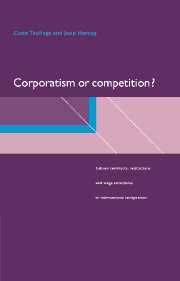 Corporatism or Competition?
Corporatism or Competition? Book contents
- Frontmatter
- Contents
- Preface
- Symbols and abbreviated references
- Synopsis
- 1 What we observe and what we claim
- 2 The role of corporatism in models of surplus sharing
- 3 Beliefs, norms and institutions
- 4 Union behaviour
- 5 Wage differentials and rent sharing
- 6 Tenure wage profiles
- 7 Unemployment and wage flexibility
- 8 Inside corporatism: how the Dutch play their game
- 9 An assessment: competition or corporatism?
- References
- Index
Preface
Published online by Cambridge University Press: 23 November 2009
- Frontmatter
- Contents
- Preface
- Symbols and abbreviated references
- Synopsis
- 1 What we observe and what we claim
- 2 The role of corporatism in models of surplus sharing
- 3 Beliefs, norms and institutions
- 4 Union behaviour
- 5 Wage differentials and rent sharing
- 6 Tenure wage profiles
- 7 Unemployment and wage flexibility
- 8 Inside corporatism: how the Dutch play their game
- 9 An assessment: competition or corporatism?
- References
- Index
Summary
In 1992 Dr Gerard de Vries, of the Dutch Ministry of Social Affairs and Employment, called us and asked if we would be interested in doing a study on wage formation. The on-going debate in the Netherlands had reached the stage where decentralization, deregulation and increased wage differentiation were the buzz words. We agreed, because of the challenge of the questions being asked and also because, as it turned out, we would get access to an extensive dataset sleeping in the vaults of the department. Our report, overdue, was the beginning of this work. We started an international comparison of wage equations, got help from friends in foreign places and got excited about what we found. The Ministry retained a lively interest in the project, extended its funding and stole one of the authors. The transfer certainly facilitated disclosure of our results to an interesting and interested set of policy makers. During the project, OSA, the Organization for Strategic Labour Market Research came along with questions on the effect of mandatory extension and funded work (jointly with Richard Freeman, from Harvard and the LSE) that eventually was also integrated into the project.
Support came of course also through the usual and valuable channels of academic interaction. We presented material from the research at conferences or seminars in Madrid (CEMFI-CEPR), Stockholm (FIEF), the Tinbergen Institute in Amsterdam and Rotterdam, Nagoya University, The Labour Economists Meeting in Kyoto, The Biwako Lake Conference, the University of Texas at Dallas, The Southern Methodist University also in Dallas, the Aarhus Center for Labour Market and Social Research and the Istanbul Meetings of the EEA.
- Type
- Chapter
- Information
- Corporatism or Competition?Labour Contracts, Institutions and Wage Structures in International Comparison, pp. xi - xiiPublisher: Cambridge University PressPrint publication year: 1998
